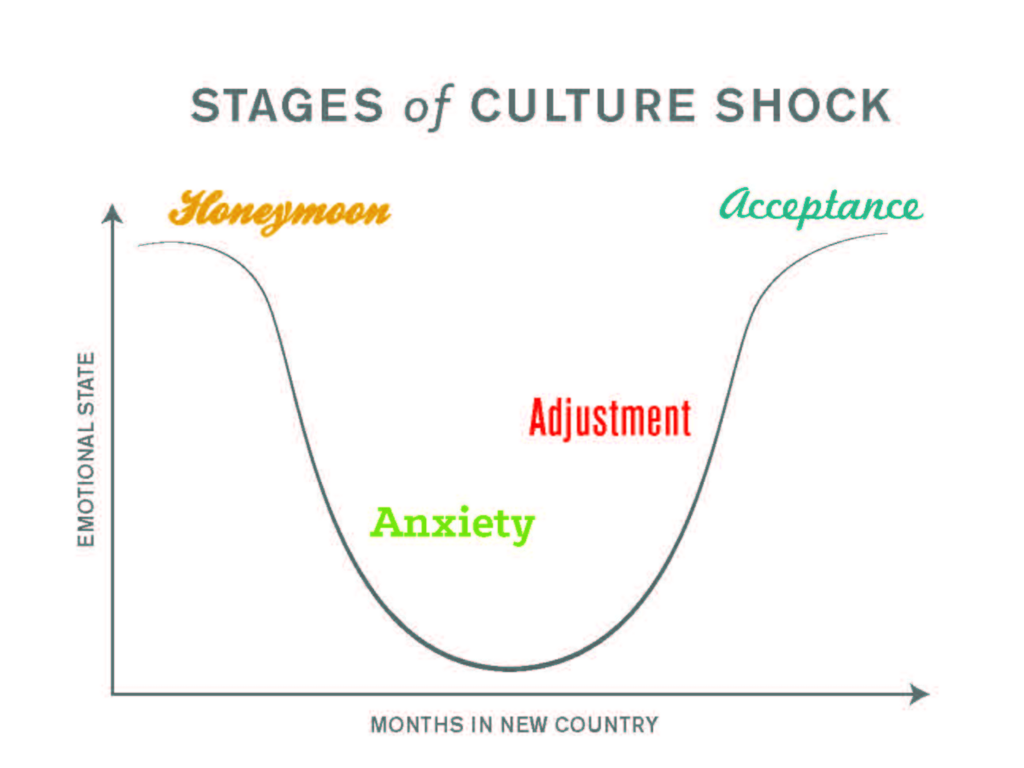Hello, international students! I am Dr. Arna Erega. I am excited to begin my second year as a counselor for international students at The University of Texas at Austin’s Counseling and Mental Health Center (CMHC).
In this blog post, I will explore the Four Stages of Cultural Adjustment and what you may expect with each.
As a former international student, I experienced various transition-related issues and challenges associated with cultural adjustment and acculturation. So, I can empathize with you and know that you will find the insights in this post helpful.
1) First Stage: The Honeymoon
The first stage of cultural adjustment is called “The Honeymoon” and is defined by initial euphoria and excitement. During this stage, international students experience excitement toward everything that is new to them. Involvement with the host culture is superficial, and the international student feels like a tourist. Students are curious about similarities and differences between their home culture and the new culture. Students are very motivated, cooperative, and interested in learning about the new culture. They, however, generally expect that they will not have any adjustment issues.
2) Second Stage: Culture Shock
The second stage is known as “Culture Shock” and is defined by irritation and hostility. The “everything is new” attitude has worn off, and the students are now mainly focused on the differences between the two cultures. Small differences feel like major problems, and students start to feel stressed, helpless, and frustrated. Stereotypes and prejudices become more apparent, and students may feel like nothing is helpful. Students start to search for American friends while also feeling homesick and missing their friends at home.

3) Third Stage: Gradual Adjustment
The third stage is “Gradual Adjustment,” during which students start to experience humor again and expand their perspectives. They begin to understand and accept aspects of the host culture and start feeling more comfortable and less isolated. Students continue to experience the ups and downs of cultural adjustment, but they are able to laugh at something that was annoying before. Students also become better at focusing on their learning and are able to explore options in their lives, which can be exciting and daunting at the same time.
4) Fourth Stage: Feeling at Home
The final stage of cultural adjustment is “Feeling at Home,” which is defined by adaptation and biculturalism. In this stage, students perceive the host culture as another home and are not affected negatively by it anymore, at least not significantly. Upon reaching this stage, international students may feel more able to live up to their full potential.
How can you cope with these stages?
You can learn more about cultural adjustment and helpful tools for successfully navigating life in a new culture, like you just did by reading this blog.
Also, you can identify which stage you are in and work on being flexible, kind and compassionate toward yourself.
Furthermore, developing stress management skills and a growth mindset can be very helpful.
Lastly, do not forget that you can always reach out to counselors at the CMHC by phone (512) 471-3515, via the Crisis Line (512) 471-2255 for crisis situations, through MySSP (My Student Support Program), or the Thrive App!
Yours truly,
Dr. Arna Erega
Feel free to reach out to me at arna.erega@austin.utexas.edu or join one of my International Student Drop-In Groups.
